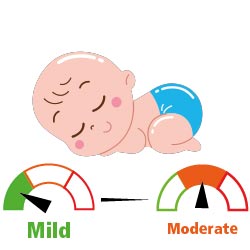- Avoid exposure to allergen
In excessive nasal secretions (Rinorrhea,sneezing,itching ):
- Histazin 5mg/5ml syrup 1-3ml daily in 1 or 2 divided doses
In nasal obstruction:
- Apisal 9mg/ml drop 1drop 4-6 times daily
Paractamol
- Analgesic and antipyretics
- Not anti-inflammatory effect
- Suitable for Temperature between (37.5C – 38.5C)
- Safe under 6 months
Trade names : ( Revanin ,Adol,Panda,Dolocet ,Feverol, panadol )
Concentrations: 500 mg tablet, ,1g tablet ,125 mg/5 ml syrup, 250 mg/5 ml syrup, 125 mg suppositories, 250 mg suppositories,1g/100ml solution for infusion
Dose :
Tablet, capsule :
- 500mg tabs 1-2 tabs /cap every 6 hours
Syrup, suspension :
- < 5year : 125mg/5ml susp (w/2) Every 4 – 6 hours
- 5-12 year : 250mg/5ml susp (w/4) Every 4 – 6 hours
Suppositories :
- <1Y : 125 mg supp Every 8 hours (1 supp x 3 )
- >1Y : 250mg supp Every 8 hours ( 1supp x 3 )
Iv solution 1g/100ml :
- <10kg : 0 .75ml/kg
- >10kg , <50kg : 1.5ml/kg
- >50kg : 100ml Slowly over 15 minute
Maximum dose : 4g daily
Pregnancy and lactation : Paracetamol is the first choice of painkiller in pregnancy and breastfeeding
Promethazine
Available forms:
- Histazin : 5mg/5ml syrup, 25mg tab
- Promet: 25mg tab
- Promethazine: 50mg/2ml for iv,im injection
Therapeutic indications
- As symptomatic treatment for allergic conditions of the upper respiratory tract and skin including allergic rhinitis, urticaria and anaphylactic reactions to drugs and foreign proteins.
- As an antiemetic.
- For short term use in treatment of insomnia in adults.
- For short term use as a paediatric sedative.
The usual doses are:
25mg tablet:
- Adults and Children>10 years : Start with 1 tablet (25 mg) taken at night. This maybe increased to a maximum of 1 tablet (25 mg) twice a dayif necessary.
- Children 5-10 years: A single tablet (25 mg) given at night. DO NOT give more than 25 mg per day.
50mg/2ml for iv,im injection
- Adult : 25 mg; may be repeated in 2 hours when necessary; switch to PO as soon as possible
- Pediatrics≥2 years: 12.5-25 mg IM at bedtime
5mg/5ml syrup:
- 2-5 years: 5-15 mg(1-3ml) daily in 1 or 2 divided doses
- >5-10 years : 10-25(2-5ml) mg daily in 1 or 2 divided doses
Contraindications
- should not be used in patients in coma or suffering from CNS depression of any cause.
- should not be given to patients with a known hypersensitivity to any of the excipients.
- contraindicated for use in children less than two years of age because of the potential for fatal respiratory depression..
pregnancy and lactation
- should not be used in pregnancy unless the physician considers it essential.
- The use is not recommended in the 2 weeks prior to delivery in view of the risk of irritability and excitement in the neonate.
- Available evidence suggests that the amount excreted in milk is insignificant. However, there are risks of neonatal irritability and excitement.
Side effects
- drowsiness, dizziness, restlessness, headaches, nightmares, tiredness, and disorientation. blurred vision, dry mouth and urinary retention
Apisal 9mg/ml drop, 7.4mg/ml spray
- Nasal decongestant
- is a safe drug-free physiological saline solution
- can be used as often as needed, to cleanse and moisturize nasal passages and help in removing incrustations, bacteria, viruses, allergens or irritants entrapped in the nasal mucosa.
- Nasal Dryness & Congestion
- relieves nasal congestion by thinning mucus and moisturizes membranes
Dose in adult and pediatrics:
- 1puffs /drop 4-6 times daily
Pregnancy and lactation:
- Save
In Emergency room:
- Give Antihistamine In sneezing and rhinorrhea :
- Allerfin 10mg/ml IM injection :
Dose:
- 1-5 year : 25-5mg (½ ml )
- 6-12 year: 5-10mg (1ml )
- Adult : 10-20 mg (1-2 ml )
- Give Dexamethasone 4mg/1ml
Dose:
Pediatrics:
- 0.3 mg/kg/day IV / IM divided q6hr or q12hr
Adult:
- 4-8 mg IM /IV
Allergic rhinitis
Presentation :
- Rhinorrhea
- Repetitive sneezing
- nasal congestion, obstruction
- postnasal drainage
- Pruritus
- Itching of the palate, nose, ears, eye
- Snoring
- Frequent sore throats
- Cough
- Headache
- Itching redness watery eyes
Lines of management :
- Avoid exposure to allergens
- In excessive secretions and sneezing: oral antihistamine
- If nasal obstruction: Nasal decongestant
- For ocular symptoms: intranasal antihistamine
- If Symptoms persist and affect quality of life: Intranasal Corticosteroid
- Sever and persistent symptoms: Intranasal Corticosteroid + oral or intranasal antihistamine+ Oral leukotriene receptors antagonist
